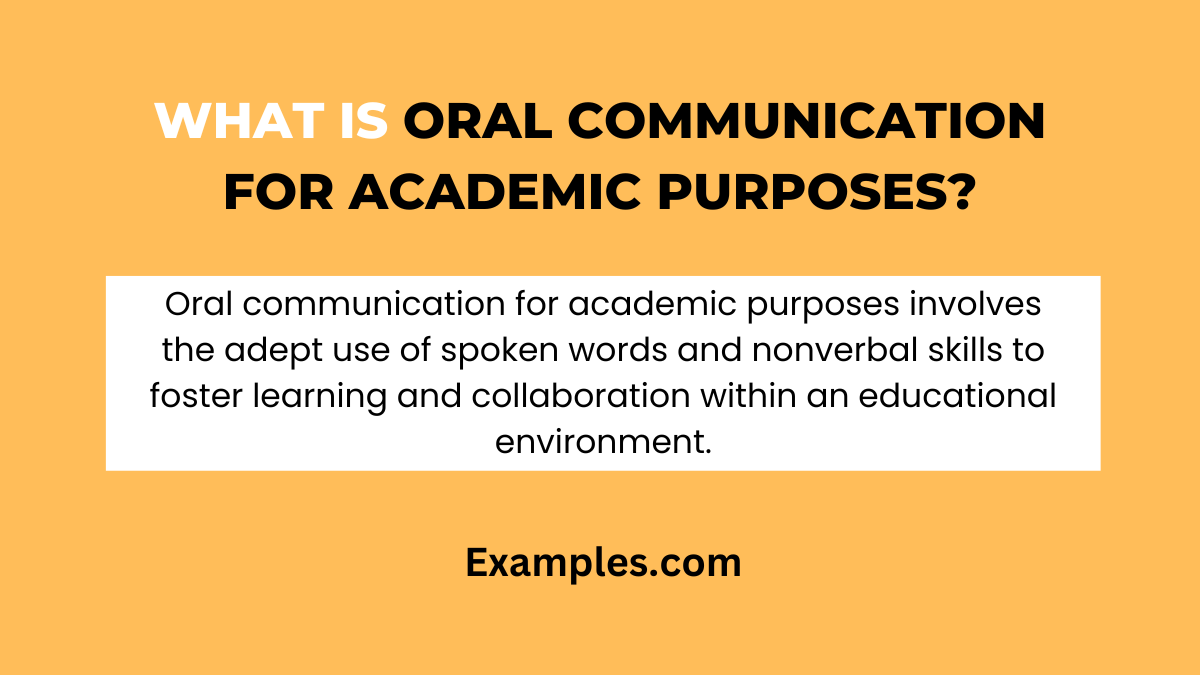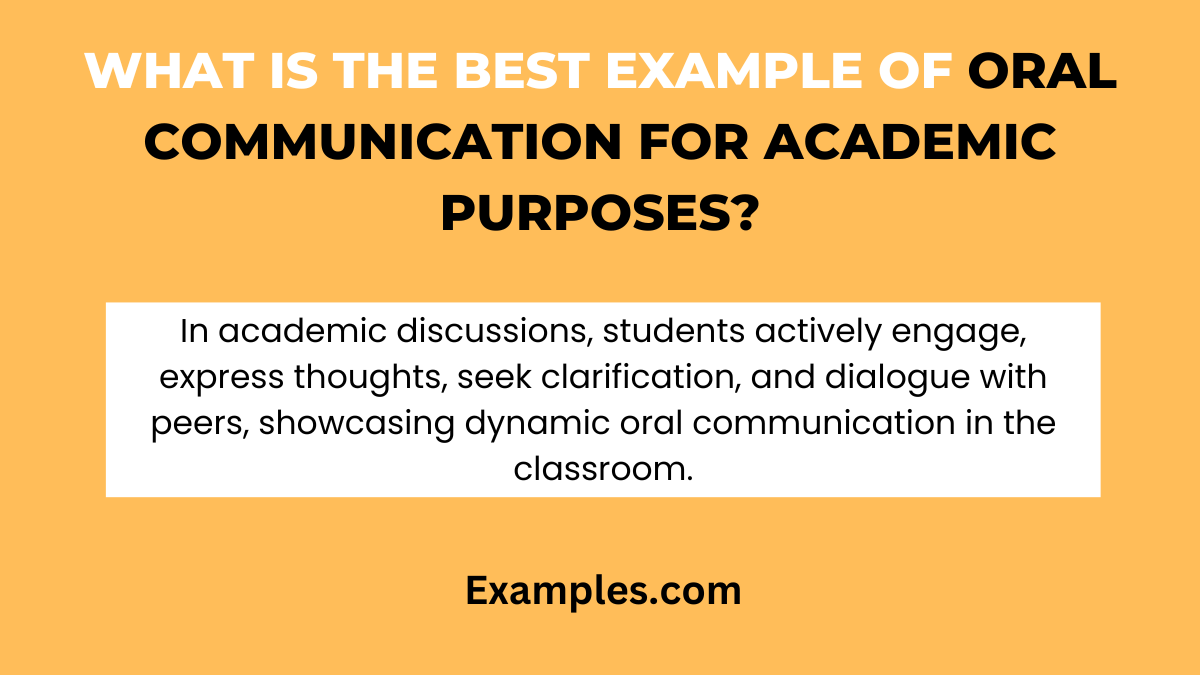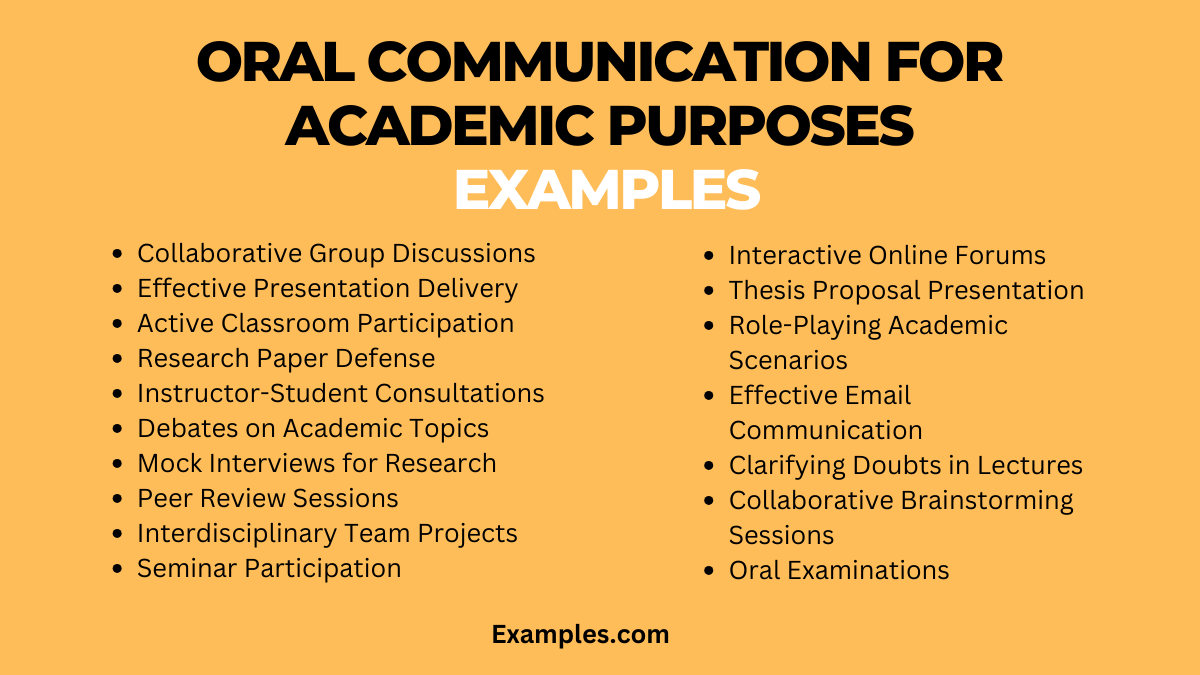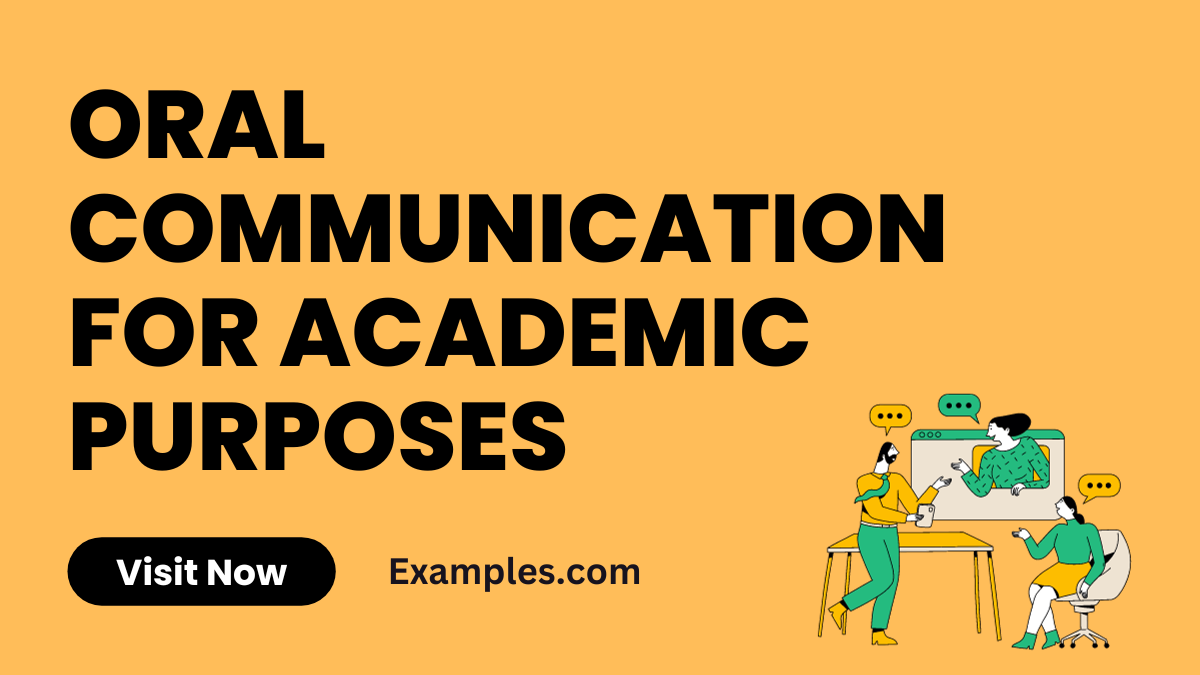Oral Communication for Academic Purposes
Unlock the comprehensive realm of Oral Communication for Academic Purposes with our detailed guide. Delve into effective strategies, communication examples, and expert tips to refine your academic discourse. Navigating the intricacies of interpersonal and group communication, this guide empowers you with the skills needed for success in educational settings. Elevate your academic journey by mastering verbal and nonverbal communication nuances, ensuring clarity, understanding, and impactful interactions. Explore Communication Examples that enrich your scholarly experience, fostering effective engagement and collaboration.
What is Oral Communication for Academic Purposes?

Oral communication for academic purposes encompasses the exchange of information and ideas through spoken words within an educational setting. It involves the effective use of verbal and nonverbal communication skills to facilitate learning, discussions, and collaborative activities among students, educators, and other stakeholders.
What is the Best Example of Oral Communication for Academic Purposes?

An exemplary instance of oral communication for academic purposes is the dynamic interaction during a classroom discussion. In this scenario, students actively participate, expressing their thoughts, seeking clarification, and engaging in meaningful dialogue with peers and the instructor.
This example involves students using effective verbal communication skills to articulate their ideas, listen attentively to others, and constructively contribute to the academic discourse. It showcases the importance of clear expression, active listening, and collaborative interaction in fostering a conducive learning environment.
30 Oral Communication for Academic Purposes Examples

These examples showcase the diverse ways oral communication contributes to academic excellence, empowering individuals to navigate the educational landscape with confidence and proficiency.
- Collaborative Group Discussions: Engage peers in collaborative discussions, fostering a dynamic exchange of ideas and perspectives for enhanced learning outcomes.
- Effective Presentation Delivery: Master the art of delivering impactful presentations, ensuring clarity, coherence, and audience engagement.
- Active Classroom Participation: Contribute actively in class, asking questions, sharing insights, and participating in group activities to enrich the learning environment.
- Research Paper Defense: Present and defend your research findings eloquently, showcasing in-depth understanding and analytical skills.
- Instructor-Student Consultations: Seek guidance through effective communication in one-on-one sessions with instructors for personalized academic support.
- Debates on Academic Topics: Engage in debates, articulating and defending your stance on academic subjects to sharpen critical thinking skills.
- Mock Interviews for Research: Participate in mock interviews, honing communication skills for research-related discussions and academic interviews.
- Peer Review Sessions: Contribute constructively in peer review sessions, providing valuable feedback and receiving insights on academic work.
- Interdisciplinary Team Projects: Collaborate in interdisciplinary projects, communicating seamlessly with team members from diverse academic backgrounds.
- Seminar Participation: Actively participate in seminars, presenting ideas, and engaging in discussions with scholars to broaden academic perspectives.
- Interactive Online Forums: Contribute to online forums, fostering virtual academic discussions and knowledge-sharing.
- Thesis Proposal Presentation: Deliver a compelling thesis proposal presentation, showcasing the significance and methodology of your research.
- Role-Playing Academic Scenarios: Engage in role-playing scenarios, simulating academic situations for effective problem-solving communication.
- Effective Email Communication: Master the art of concise and professional email communication for academic correspondence.
- Clarifying Doubts in Lectures: Verbally articulate and clarify doubts during lectures, promoting a deeper understanding of academic concepts.
- Collaborative Brainstorming Sessions: Participate in collaborative brainstorming sessions, contributing ideas and solutions for academic projects.
- Socratic Method Discussions: Engage in Socratic method discussions, promoting critical thinking and analytical discourse in academic settings.
- Thorough Literature Review Discussions: Discuss literature reviews thoroughly, extracting key insights and critiquing academic publications.
- Effective Questioning Techniques: Develop effective questioning techniques to foster insightful discussions and encourage critical analysis.
- Engaging Academic Webinars: Attend and actively participate in academic webinars, contributing to discussions and gaining insights from experts.
- Oral Examinations: Prepare and excel in oral examinations, effectively communicating knowledge and understanding of academic subjects.
- Summarizing Academic Articles: Hone the skill of summarizing complex academic articles, conveying key points with precision and clarity.
- Participation in Academic Conferences: Engage in academic conferences, presenting research and networking with scholars for collaborative opportunities.
- Collaborative Problem Solving: Collaborate with peers in problem-solving activities, communicating solutions effectively in an academic context.
- Effective Use of Academic Vocabulary: Enhance communication by incorporating specialized academic vocabulary, ensuring clarity and precision.
- Group Research Project Discussions: Discuss and plan group research projects, ensuring effective communication and coordination among team members.
- Academic Journal Club Participation: Participate in an academic journal club, discussing and critically evaluating research articles with peers.
- Interactive Study Groups: Form or join study groups, engaging in interactive discussions to deepen understanding and share knowledge.
- Constructive Feedback Sessions: Provide and receive constructive feedback in academic settings, fostering continuous improvement in work.
- Effective Communication in Academic Workshops: Attend and actively contribute to academic workshops, refining skills and gaining insights from experts in the field.
Oral Communication for Academic Purposes in College Examples
Unlock the art of effective communication in your college journey with these impactful Oral Communication for Academic Purposes examples, designed to elevate your scholarly engagement and success.
- Classroom Debates: Engage in structured debates, articulating and defending your academic viewpoints with clarity and persuasion.
- Group Research Project Discussions: Collaborate on group research projects, ensuring seamless communication to achieve collective academic goals.
- Interactive Seminar Presentations: Present seminars interactively, engaging the audience and fostering meaningful academic discussions.
- Effective Study Group Communication: Facilitate study group sessions with clear communication, promoting shared understanding and academic success.
- Oral Examinations Preparation Discussions: Participate in discussions to prepare for oral examinations, refining communication skills for academic assessments.
- Panel Discussions on Academic Topics: Contribute to panel discussions, offering insights and perspectives on academic subjects for a diverse audience.
- Thesis Defense Presentation: Deliver a compelling thesis defense, showcasing mastery of your academic research with articulate communication.
- Mock Job Interview for Academia: Engage in a mock job interview, refining communication for academic job applications and career prospects.
- Case Study Analysis Discussions: Analyze case studies collaboratively, communicating insights and solutions with fellow students for academic enrichment.
- Effective Participation in Academic Workshops: Actively participate in academic workshops, sharing ideas and learning from experts to enhance academic skills.
Oral Communication for Academic Purposes at Workplace Examples
Unlock the fusion of academic expertise and workplace dynamics with these examples tailored for professional environments. Enhance your verbal proficiency to effectively navigate academic tasks in the workplace.
- Collaborative Project Meetings: Engage colleagues in collaborative project meetings, articulating academic insights to drive workplace solutions.
- Strategic Planning Discussions: Contribute academically in strategic planning discussions, aligning academic knowledge with organizational goals.
- Training Program Presentations: Deliver training program presentations, blending academic content seamlessly for effective workplace learning.
- Interdisciplinary Team Collaborations: Communicate with interdisciplinary teams, bridging academic perspectives to achieve workplace objectives.
- Client Consultations with Academic Insights: Provide client consultations, incorporating academic insights for comprehensive and informed solutions.
- Academic Research Integration in Proposals: Integrate academic research into proposals, showcasing a depth of knowledge for workplace innovations.
- Effective Academic Communication in Reports: Communicate academic findings effectively in reports, ensuring clarity and relevance for workplace stakeholders.
- Workplace Seminars with Academic Expertise: Conduct workplace seminars, infusing academic expertise to enlighten and engage professional audiences.
- Leadership Meetings with Academic Analysis: Contribute academically in leadership meetings, providing insightful analyses for informed decision-making.
- Academic Insights in Team Brainstorming: Engage in team brainstorming sessions, leveraging academic insights to fuel creative workplace solutions.
Oral Communication for Academic Purposes in Classroom Examples
Enhance your academic journey with these diverse Oral Communication for Academic Purposes examples tailored for the classroom environment. Master the art of effective communication, fostering a dynamic and collaborative learning atmosphere.
- Classroom Discussions: Engage actively in classroom discussions, sharing insights, posing questions, and contributing to a vibrant academic discourse.
- Peer-to-Peer Clarifications: Strengthen understanding by seeking and providing clarifications with peers, promoting collaborative learning within the classroom.
- Group Project Planning: Collaborate efficiently on group projects, communicating ideas, dividing tasks, and ensuring seamless coordination among team members.
- Interactive Q&A Sessions: Participate in interactive Q&A sessions during lectures, fostering a supportive environment for addressing queries and sharing knowledge.
- Presentation of Research Findings: Articulate and present research findings in the classroom, refining your communication skills while sharing valuable academic insights.
- Mock Debates on Course Topics: Engage in mock debates centered around course topics, refining argumentative and persuasive communication skills in a controlled environment.
- Effective Use of Visual Aids: Communicate complex concepts with clarity by incorporating visual aids, enhancing understanding and engagement during academic presentations.
- In-Class Group Activities: Excel in in-class group activities, communicating effectively with team members to achieve common academic goals.
- Facilitation of Workshops: Take on the role of a workshop facilitator, guiding classmates through interactive sessions, promoting collaborative learning and communication.
- Participation in Socratic Seminars: Join Socratic seminars, engaging in critical discussions, posing thoughtful questions, and collectively exploring academic topics in-depth.
Why is Oral Communication Important for Academic Purposes?
Oral communication is a cornerstone of academic success, playing a pivotal role in facilitating effective teaching and learning experiences. This comprehensive guide explores the significance of oral communication for teachers in academic settings, shedding light on its multifaceted impact.
1. Fostering Student Engagement: Oral communication captivates students, fostering active engagement and participation in classroom discussions, creating a dynamic learning environment.
2. Clarifying Complex Concepts: Teachers utilize oral communication to simplify intricate academic concepts, ensuring students grasp and comprehend challenging subject matter effectively.
3. Building Rapport with Students: Verbal interactions allow teachers to build strong connections with students, creating a supportive and conducive atmosphere for effective learning.
4. Enhancing Teacher-Student Relationships: Effective oral communication strengthens relationships between teachers and students, fostering trust, understanding, and a positive academic rapport.
5. Encouraging Critical Thinking: Oral communication encourages students to express their thoughts, fostering critical thinking skills through articulate verbal expression and debate.
6. Promoting Collaborative Learning: Teachers utilize oral communication to facilitate collaborative learning, encouraging students to work together, share ideas, and collectively solve problems.
7. Tailoring Instructional Approaches: Through verbal communication, teachers can adapt their instructional approaches, addressing diverse learning styles and ensuring inclusivity in the academic process.
8. Providing Timely Feedback: Oral communication enables teachers to provide immediate feedback, allowing students to grasp their strengths and areas for improvement promptly.
What are the Objectives of Oral Communication for Teachers?
Oral communication is a cornerstone in a teacher’s toolkit, serving multifaceted objectives crucial for effective education. This comprehensive guide delves into the key objectives that shape and enrich the oral communication skills of educators.
1. Clarity in Instruction: The primary objective is to ensure clarity in instructional delivery. Teachers aim to articulate concepts in a manner that students can easily comprehend, fostering a conducive learning environment.
2. Fostering Student Engagement: Oral communication seeks to actively engage students, encouraging participation, questions, and discussions. This engagement enhances the overall learning experience.
3. Building Positive Teacher-Student Relationships: Effective oral communication is instrumental in building positive relationships between teachers and students, creating an atmosphere of trust, support, and open communication.
4. Promoting Critical Thinking: Teachers employ oral communication to stimulate critical thinking skills among students. Discussions, debates, and thoughtful questioning foster analytical abilities.
5. Providing Constructive Feedback: An essential objective is to offer constructive feedback on student performance. Clear and constructive communication aids in student development and improvement.
6. Creating Inclusive Classrooms: Oral communication aims to create inclusive classrooms, ensuring that all students, regardless of diverse backgrounds, feel heard and valued.
7. Effective Classroom Management: Teachers use oral communication to establish and maintain effective classroom management, conveying expectations, rules, and instructions clearly.
8. Adapting to Diverse Learning Styles: Recognizing and adapting to diverse learning styles is an objective. Teachers use varied communication approaches to cater to the needs of different learners.
Tips for Effective Oral Communication for Teachers
Effective oral communication is a cornerstone of successful teaching, fostering a positive and engaging learning environment. Here are comprehensive tips to enhance your oral communication skills as a teacher:
- Clarity and Conciseness: Ensure clarity in your speech, avoiding jargon, and expressing ideas concisely to facilitate understanding among students.
- Active Listening: Cultivate active listening skills to understand students’ concerns, respond thoughtfully, and create a responsive and empathetic classroom atmosphere.
- Nonverbal Communication: Pay attention to nonverbal cues, including body language and facial expressions, to convey warmth, encouragement, and enthusiasm.
- Adaptability: Adapt your communication style to suit diverse learning preferences, ensuring all students can connect with the material.
- Engage in Two-Way Communication: Encourage students to ask questions, share their thoughts, and actively participate in discussions to create a collaborative learning space.
- Use of Visual Aids: Enhance comprehension by incorporating visual aids, such as slides or diagrams, to complement verbal explanations.
- Effective Use of Pauses: Use strategic pauses to emphasize key points, allow students to absorb information, and create a natural flow in your communication.
- Empathy and Understanding: Demonstrate empathy by understanding students’ individual needs, addressing concerns, and fostering a supportive educational environment.
In summary, oral communication for academic purposes is an indispensable skill in the educational landscape. It not only enhances students’ ability to convey their ideas clearly and effectively but also fosters critical thinking and collaborative learning. By mastering these skills, students prepare themselves not just for academic success, but for a lifetime of effective communication in various professional and personal settings. Continual practice, feedback, and adaptation of these skills are key to developing a strong communicative ability that transcends academic environments.
For further exploration into effective communication techniques in an academic context, the Stanford University’s Speaking of Teaching series offers valuable insights and strategies. This resource is an excellent guide for educators and students alike, seeking to enhance their oral communication skills. Additionally, the Purdue Online Writing Lab (OWL) provides comprehensive guides and resources on various aspects of academic communication, including oral presentations, making it a vital tool for any academic communicator.



